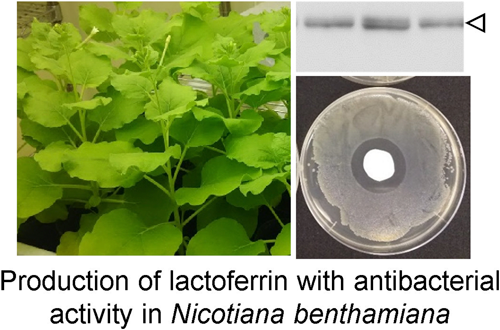2 0 0 0 OA Expressing recombinant human lactoferrin with antibacterial activity in Nicotiana benthamiana
- 著者
- Kenji Miura Yuriko Nagai Akira Yokouchi Kazuya Miwa
- 出版者
- Japanese Society for Plant Biotechnology
- 雑誌
- Plant Biotechnology (ISSN:13424580)
- 巻号頁・発行日
- vol.40, no.1, pp.63-69, 2023-03-25 (Released:2023-03-25)
- 参考文献数
- 43
Lactoferrin is a non-hematic iron-binding 80-kDa protein that exhibits antimicrobial activity. Higher plants function as “green bioreactors” for large-scale recombinant protein production. In this study, we transiently expressed recombinant human lactoferrin (rhLF) in Nicotiana benthamiana at a yield of approximately 40 µg g−1 fresh mass (gFM) using the Tsukuba system. Additionally, the expression level of rhLF increased when it was fused with KDEL, an endoplasmic reticulum retention motif. Purified plant-derived rhLF possesses antibacterial activity that inhibits the growth of Escherichia coli. These results indicated that rhLF containing antimicrobial activity can be produced in N. benthamiana using the Tsukuba system.
1 0 0 0 OA Efficient Transient Expression for Functional Analysis in Fruit Using the Tsukuba System Vector
- 著者
- Masafumi Omori Yosuke Fujiwara Hisayo Yamane Kenji Miura Ryutaro Tao
- 出版者
- The Japanese Society for Horticultural Science
- 雑誌
- The Horticulture Journal (ISSN:21890102)
- 巻号頁・発行日
- pp.QH-062, (Released:2023-06-14)
Evaluating the function of genes expressed in fruit tissues of fruit tree species using a genetic transformation approach is a long process because the trees are generally recalcitrant to genetic transformation and cannot bear fruit during their long juvenile phases. Transient gene expression in fruit enables the functional analysis of genes associated with fruit traits, which may accelerate the study of fruit physiology. Here, by using the recently developed “Tsukuba system”, we successfully established an efficient transient expression system in harvested fruit tissues. The “Tsukuba system” utilizes a combination of the geminiviral replication system and a double terminator, which ensures sufficient levels of transgene expression. We used blueberry fruit as a model to characterize the applicability of this system for transient expression in fruit tissue. The pTKB3-EGFP vector was introduced by agroinfiltration into the fruit tissues of several blueberry cultivars. We found that transient GFP fluorescence in fruit peaked 4–6 days after agroinfiltration. Agrobacterium suspensions were easily injected into soft, mature fruit, and GFP was strongly expressed; however, hard, immature fruit were not penetrable by Agrobacterium suspensions, and GFP was rarely detected. We then tested the applicability of the developed system to other fruit tree species: six families, 17 species, and 26 cultivars. GFP fluorescence was detected in all species, except for Japanese apricot. In blueberry, bilberry, sweet cherry, apricot, and satsuma mandarin, GFP was highly expressed and observed in a large proportion of the flesh. In kiwifruit, hardy kiwifruits, persimmon, peach, apple, European pear, and grape, GFP fluorescence was limited to certain parts of the fruits. Finally, transient VcMYBA1 overexpression in blueberry was tested as a model for gene functional analysis in fruit. Transient VcMYBA1 overexpression induced red pigmentation in the flesh, suggesting that VcMYBA1 expression caused anthocyanin accumulation. This study provides a technical basis for the rapid evaluation of genes expressed in fruit, which will be useful for gene function evaluation studies in fruit crops with long juvenile phases.
- 著者
- Shohei Nosaki Ken Hoshikawa Hiroshi Ezura Kenji Miura
- 出版者
- Japanese Society for Plant Biotechnology
- 雑誌
- Plant Biotechnology (ISSN:13424580)
- 巻号頁・発行日
- vol.38, no.3, pp.297-304, 2021-09-25 (Released:2021-09-25)
- 参考文献数
- 60
- 被引用文献数
- 31
The production of recombinant proteins is important in academic research to identify protein functions. Moreover, recombinant enzymes are used in the food and chemical industries, and high-quality proteins are required for diagnostic, therapeutic, and pharmaceutical applications. Though many recombinant proteins are produced by microbial or mammalian cell-based expression systems, plants have been promoted as alternative, cost-effective, scalable, safe, and sustainable expression systems. The development and improvement of transient expression systems have significantly reduced the period of protein production and increased the yield of recombinant proteins in plants. In this review, we consider the importance of plant-based expression systems for recombinant protein production and as genetic engineering tools.
- 著者
- Shohei Nosaki Ken Hoshikawa Hiroshi Ezura Kenji Miura
- 出版者
- Japanese Society for Plant Biotechnology
- 雑誌
- Plant Biotechnology (ISSN:13424580)
- 巻号頁・発行日
- pp.21.0610a, (Released:2021-09-18)
- 参考文献数
- 60
- 被引用文献数
- 31
The production of recombinant proteins is important in academic research to identify protein functions. Moreover, recombinant enzymes are used in the food and chemical industries, and high-quality proteins are required for diagnostic, therapeutic, and pharmaceutical applications. Though many recombinant proteins are produced by microbial or mammalian cell-based expression systems, plants have been promoted as alternative, cost-effective, scalable, safe, and sustainable expression systems. The development and improvement of transient expression systems have significantly reduced the period of protein production and increased the yield of recombinant proteins in plants. In this review, we consider the importance of plant-based expression systems for recombinant protein production and as genetic engineering tools.
